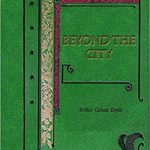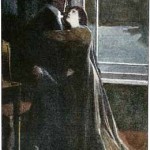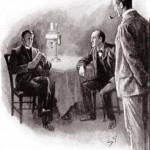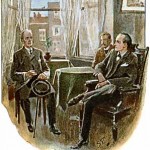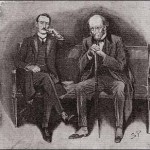I had called upon my friend Sherlock Holmes upon the second morning after Christmas, with the intention of wishing him the compliments of the season. He was lounging upon the sofa in a purple dressing-gown, a pipe-rack within his reach upon the right, and a pile of crumpled morning papers, evidently newly studied, near at hand. Beside the couch was a wooden chair, and on the angle of the back hung a very seedy and disreputable hard-felt hat, much the worse for wear, and cracked in several places. A lens and a forceps lying upon the seat of the chair suggested that the hat had been suspended in this manner for the purpose of examination.
“You are engaged,” said l; “perhaps I interrupt you.”
“Not at all. I am glad to have a friend with whom I can discuss my results. The matter is a perfectly trivial one” — he jerked his thumb in the direction of the old hat — “but there are points in connection with it which are not entirely devoid of interest and even of instruction.”
I seated myself in his armchair and warmed my hands before his crackling fire, for a sharp frost had set in, and the windows were thick with the ice crystals. “I suppose,” I remarked, “that, homely as it looks, this thing has some deadly story linked on to it — that it is the clue which will guide you in the solution of some mystery and the punishment of some crime.”
“No, no. No crime,” said Sherlock Holmes, laughing. “Only one of those whimsical little incidents which will happen when you have four million human beings all jostling each other within the space of a few square miles. Amid the action and reaction of so dense a swarm of humanity, every possible combination of events may be expected to take place, and many a little problem will be presented which may be striking and bizarre without being criminal. We have already had experience of such.”
“So much so,” l remarked, “that of the last six cases which I have added to my notes, three have been entirely free of any legal crime.”
“Precisely. You allude to my attempt to recover the Irene Adler papers, to the singular case of Miss Mary Sutherland, and to the adventure of the man with the twisted lip. Well, I have no doubt that this small matter will fall into the same innocent category. You know Peterson, the commissionaire?”
“Yes.”
“It is to him that this trophy belongs.”
“It is his hat.”
“No, no, he found it. Its owner is unknown. I beg that you will look upon it not as a battered billycock but as an intellectual problem. And, first, as to how it came here. It arrived upon Christmas morning, in company with a good fat goose, which is, I have no doubt, roasting at this moment in front of Peterson’s fire. The facts are these: about four o’clock on Christmas morning, Peterson, who, as you know, is a very honest fellow, was returning from some small jollification and was making his way homeward down Tottenham Court Road. In front of him he saw, in the gaslight, a tallish man, walking with a slight stagger, and carrying a white goose slung over his shoulder. As he reached the corner of Goodge Street, a row broke out between this stranger and a little knot of roughs. One of the latter knocked off the man’s hat, on which he raised his stick to defend himself and, swinging it over his head, smashed the shop window behind him. Peterson had rushed forward to protect the stranger from his assailants; but the man, shocked at having broken the window, and seeing an official-looking person in uniform rushing towards him, dropped his goose, took to his heels, and vanished amid the labyrinth of small streets which lie at the back of Tottenham Court Road. The roughs had also fled at the appearance of Peterson, so that he was left in possession of the field of battle, and also of the spoils of victory in the shape of this battered hat and a most unimpeachable Christmas goose.”
“Which surely he restored to their owner?”
“My dear fellow, there lies the problem. It is true that ‘For Mrs. Henry Baker’ was printed upon a small card which was tied to the bird’s left leg, and it is also true that the initials ‘H. B.’ are legible upon the lining of this hat, but as there are some thousands of Bakers, and some hundreds of Henry Bakers in this city of ours, it is not easy to restore lost property to any one of them.”
“What, then, did Peterson do?”
“He brought round both hat and goose to me on Christmas morning, knowing that even the smallest problems are of interest to me. The goose we retained until this morning, when there were signs that, in spite of the slight frost, it would be well that it should be eaten without unnecessary delay. Its finder has carried it off, therefore, to fulfill the ultimate destiny of a goose, while I continue to retain the hat of the unknown gentleman who lost his Christmas dinner.”
“Did he not advertise?”
“No.”
“Then, what clue could you have as to his identity?”
“Only as much as we can deduce.”
“From his hat?”
“Precisely.”
“But you are joking. What can you gather from this old battered felt?”
“Here is my lens. You know my methods. What can you gather yourself as to the individuality of the man who has worn this article?”
I took the tattered object in my hands and turned it over rather ruefully. It was a very ordinary black hat of the usual round shape, hard and much the worse for wear. The lining had been of red silk, but was a good deal discoloured. There was no maker’s name; but, as Holmes had remarked, the initials “H. B.” were scrawled upon one side. It was pierced in the brim for a hat- securer, but the elastic was missing. For the rest, it was cracked, exceedingly dusty, and spotted in several places, although there seemed to have been some attempt to hide the discoloured patches by smearing them with ink.
“I can see nothing,” said I, handing it back to my friend.
“On the contrary, Watson, you can see everything. You fail, however, to reason from what you see. You are too timid in drawing your inferences.”
“Then, pray tell me what it is that you can infer from this hat?”
He picked it up and gazed at it in the peculiar introspective fashion which was characteristic of him. “It is perhaps less suggestive than it might have been,” he remarked, “and yet there are a few inferences which are very distinct, and a few others which represent at least a strong balance of probability. That the man was highly intellectual is of course obvious upon the face of it, and also that he was fairly well-to-do within the last three years, although he has now fallen upon evil days. He had foresight, but has less now than formerly, pointing to a moral retrogression, which, when taken with the decline of his fortunes, seems to indicate some evil influence, probably drink, at work upon him. This may account also for the obvious fact that his wife has ceased to love him.”
“My dear Holmes!”
“He has, however, retained some degree of self-respect,” he continued, disregarding my remonstrance. “He is a man who leads a sedentary life, goes out little, is out of training entirely, is middle-aged, has grizzled hair which he has had cut within the last few days, and which he anoints with lime-cream. These are the more patent facts which are to be deduced from his hat. Also, by the way, that it is extremely improbable that he has gas laid on in his house.”
“You are certainly joking, Holmes.”
“Not in the least. Is it possible that even now, when I give you these results, you are unable to see how they are attained?”
“I have no doubt that I am very stupid, but I must confess that I am unable to follow you. For example, how did you deduce that this man was intellectual?”
For answer Holmes clapped the hat upon his head. It came right over the forehead and settled upon the bridge of his nose. “It is a question of cubic capacity,” said he; “a man with so large a brain must have something in it.”
“The decline of his fortunes, then?”
“This hat is three years old. These flat brims curled at the edge came in then. It is a hat of the very best quality. Look at the band of ribbed silk and the excellent lining. If this man could afford to buy so expensive a hat three years ago, and has had no hat since, then he has assuredly gone down in the world.”
“Well, that is clear enough, certainly. But how about the foresight and the moral retrogression?”
Sherlock Holmes laughed. “Here is the foresight,” said he putting his finger upon the little disc and loop of the hat-securer. “They are never sold upon hats. If this man ordered one, it is a sign of a certain amount of foresight, since he went out of his way to take this precaution against the wind. But since we see that he has broken the elastic and has not troubled to replace it, it is obvious that he has less foresight now than formerly, which is a distinct proof of a weakening nature. On the other hand, he has endeavoured to conceal some of these stains upon the felt by daubing them with ink, which is a sign that he has not entirely lost his self-respect.”
“Your reasoning is certainly plausible.”
“The further points, that he is middle-aged, that his hair is grizzled, that it has been recently cut, and that he uses lime- cream, are all to be gathered from a close examination of the lower part of the lining. The lens discloses a large number of hair-ends, clean cut by the scissors of the barber. They all appear to be adhesive, and there is a distinct odour of lime-cream. This dust, you will observe, is not the gritty, gray dust of the street but the fluffy brown dust of the house, showing that it has been hung up indoors most of the time, while the marks of moisture upon the inside are proof positive that the wearer perspired very freely, and could therefore, hardly be in the best of training.”
“But his wife — you said that she had ceased to love him.”
“This hat has not been brushed for weeks. When I see you, my dear Watson, with a week’s accumulation of dust upon your hat, and when your wife allows you to go out in such a state, I shall fear that you also have been unfortunate enough to lose your wife’s affection.”
“But he might be a bachelor.”
“Nay, he was bringing home the goose as a peace-offering to his wife. Remember the card upon the bird’s leg.”
“You have an answer to everything. But how on earth do you deduce that the gas is not laid on in his house?”
“One tallow stain, or even two, might come by chance; but when I see no less than five, I think that there can be little doubt that the individual must be brought into frequent contact with burning tallow — walks upstairs at night probably with his hat in one hand and a guttering candle in the other. Anyhow, he never got tallow-stains from a gasjet. Are you satisfied?”
“Well, it is very ingenious,” said I, laughing; “but since, as you said just now, there has been no crime committed, and no harm done save the loss of a goose, all this seems to be rather a waste of energy.”
Sherlock Holmes had opened his mouth to reply, when the door flew open, and Peterson, the commissionaire, rushed into the apartment with flushed cheeks and the face of a man who is dazed with astonishment.
“The goose, Mr. Holmes! The goose, sir!” he gasped.
“Eh? What of it, then? Has it returned to life and flapped off through the kitchen window?” Holmes twisted himself round upon the sofa to get a fairer view of the man’s excited face.
“See here, sir! See what my wife found in its crop!” He held out his hand and displayed upon the centre of the palm a brilliantly scintillating blue stone, rather smaller than a bean in size, but of such purity and radiance that it twinkled like an electric point in the dark hollow of his hand.
Sherlock Holmes sat up with a whistle. “By Jove, Peterson!” said he, “this is treasure trove indeed. I suppose you know what you have got?”
“A diamond, sir? A precious stone. It cuts into glass as though it were putty.”
“It’s. more than a precious stone. It is the precious stone.”

